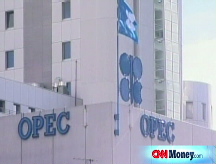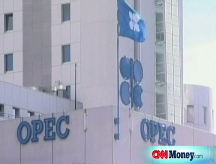Oil ends at 5-month low on OPEC talk
Crude futures decline amid expectations the cartel won't officially cut production, and as Hurricane Ike appears set to miss the Gulf production fields.

NEW YORK (CNNMoney.com) -- Oil prices fell Tuesday, as investors believed OPEC will keep production at current levels, and as Hurricane Ike lost strength over Cuba.
U.S. crude for October delivery settled down $3.08 to $103.26 a barrel, the lowest close since April 1, when oil ended the day at $100.98 a barrel.
Waiting for OPEC: The Organization of Petroleum Exporting Countries met Tuesday to discuss production levels in light of falling prices and a perceived pullback in demand as the world economy slows.
Slumping global energy demand has caused the price of crude to fall sharply from the record-high $147.27 a barrel, set on July 11.
Because of the more than $40 drop in oil prices, some OPEC member-states have been calling for tighter production requirements.
As the cartel met in Vienna, traders listened for word on possible production cuts.
The oil minister of Saudi Arabia, Ali Naimi, indicated that he did not think the production levels need to be changed, according to reports from the Associated Press.
"The market is fairly well balanced," Naimi told the AP on Tuesday. "I think things are in balance, in a healthy position." Because Saudi Arabia is a heavyweight in the cartel, Naimi's comments were closely watched.
A day before, the oil minister from Kuwait expressed similar sentiment.
The meeting was still in progress as floor trading ended in New York.
"If they cut production to try to shore up prices, that would be viewed very unfavorably by the markets that are struggling," said Phil Flynn, senior market analyst at Alaron Trading.
"I don't think OPEC wants to be viewed as muddying up the waters here, so they will be forced to do nothing," he said. "My general sense right now is that OPEC is more concerned about demand destruction than about the price drop."
Another analyst said that while it looks as if OPEC will not officially cut production, it may try to adhere to quotas more strictly.
"They are probably 700,000 to 800,000 barrels each day over their quotas," said Andrew Lebow, a broker at MF Global in New York. "The chat is that they might adhere more to the quotas."
"As usual, the Saudis are the key," said Lebow. When it comes to the "increase over the quotas, they are the ones that have the lion share."
Hurricane Ike: Hurricane Ike lost strength Tuesday and moved toward missing most U.S. offshore facilities, reducing worries that it could keep production shuttered in the Gulf of Mexico.
The National Hurricane Center downgraded the storm to a Category 1 hurricane as it passed over Cuba.
"There is a sense that the storm might not be as bad as originally feared, and that is good news for the market, but it is also bearish news," said Flynn.
If supply is not impacted, then prices move lower, as the market focuses on sagging demand.
It seems that Ike "is going to miss most of the U.S. crude production and natural gas production areas, and track more toward Southern Texas and the Yucatan peninsula in Mexico," said Lebow. But the oil market will continue to monitor Ike, because the track can change.
The storm was expected to reach the southeastern Gulf of Mexico as early as Tuesday afternoon. "Some weakening is likely as Ike crosses Western Cuba," the Hurricane Center's public advisory said. "But restrengthening is expected once Ike moves into the Gulf of Mexico."
Gulf production: Oil rigs and refineries in the Gulf region remained on standby more than a week after Hurricane Gustav slammed into the coast of Louisiana.
About one quarter of the nation's oil production facilities are located in the Gulf.
As of Tuesday, 79.4% of crude oil production and 64.2% of natural gas production in the Gulf of Mexico remained shut from Gustav, according to the Department of Energy.
Gustav damaged two offshore drilling rigs owned by Transocean (RIG) in the Gulf of Mexico, according to Guy Cantwell, a spokesman for the company. Gustav also damaged the mooring system on a third rig, the company said Monday.
Shell has decided to wait until after Ike to return completely into the Gulf.
"Remaining production recovery from Gustav will be delayed until after we can redeploy after Hurricane Ike has safely passed," according to a written statement on Shell's Web site.
Currently,Shell (RDSA) has 240 personnel working on offshore facilities, but plans to "evacuate most or all of our Shell operated assets by Wednesday or Thursday."
On Monday, U.S. crude oil for October delivery settled up 11 cents to $106.34 a barrel, but not before falling from a trading high of $109.89 earlier in the day. A dollar rally on Monday moved oil prices back more than $3 off early session highs. ![]()






